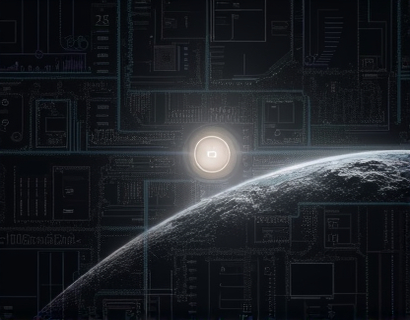Decentralized Innovation: Empowering Global Blockchain Ecosystems Through Comprehensive Collaboration Platforms
In the rapidly evolving landscape of blockchain technology, the need for robust and scalable solutions that foster collaboration and innovation has become paramount. This article delves into the concept of decentralized innovation, focusing on how comprehensive collaboration platforms can transform decentralized networks. By enhancing cooperation, resource sharing, and governance, these platforms play a crucial role in driving global efficiency and scalability for blockchain enthusiasts and innovators.
The foundation of any successful blockchain ecosystem lies in its ability to facilitate seamless interaction among its participants. Traditional centralized models often face bottlenecks and limitations, hindering the full potential of blockchain technology. Decentralized innovation addresses these challenges by creating environments where users can collaborate without intermediary constraints. This approach not only accelerates the development of new applications and services but also ensures that the benefits of blockchain are accessible to a broader audience.
Understanding Decentralized Collaboration Platforms
Decentralized collaboration platforms are designed to leverage the power of blockchain to create open, transparent, and inclusive ecosystems. These platforms utilize smart contracts and decentralized applications (dApps) to automate and secure various processes, from content creation to governance decisions. By removing central points of control, these platforms reduce the risk of censorship and ensure that all participants have equal opportunities to contribute and benefit.
One of the key features of these platforms is their ability to facilitate peer-to-peer interactions. Users can directly engage with one another, share resources, and collaborate on projects without the need for intermediaries. This direct interaction not only streamlines processes but also builds trust within the community, as transactions and communications are recorded on a transparent ledger.
Enhancing Innovation Through Collaboration
Innovation in the blockchain space is often driven by collaborative efforts. Comprehensive collaboration platforms provide the necessary tools and infrastructure for developers, researchers, and enthusiasts to come together and push the boundaries of what is possible. By fostering a culture of open-source development and shared knowledge, these platforms accelerate the pace of innovation.
For instance, developers can contribute to open-source projects, share code snippets, and receive feedback from a global community. This collective effort leads to more robust and secure solutions, as multiple perspectives and expertise are brought to the table. Moreover, the transparency inherent in blockchain technology ensures that all contributions are traceable and verifiable, further enhancing the quality and reliability of the innovations produced.
Governance in Decentralized Ecosystems
Effective governance is a cornerstone of any successful decentralized ecosystem. Comprehensive collaboration platforms incorporate governance mechanisms that allow community members to participate in decision-making processes. This democratic approach ensures that the direction of the ecosystem aligns with the collective interests of its users.
Smart contracts can be used to implement voting systems, where proposals are put to the community for approval. This not only empowers users but also increases accountability, as decisions are made transparently and with the input of the community. Additionally, governance tokens can be utilized to give stakeholders a voice in the decision-making process, further decentralizing power and ensuring that no single entity has undue influence.
Driving Global Efficiency and Scalability
The impact of decentralized collaboration platforms extends beyond individual projects and communities. By creating a unified framework for collaboration and innovation, these platforms drive global efficiency and scalability in the blockchain space. Standardized protocols and interoperable solutions enable different blockchain networks to work together seamlessly, breaking down silos and fostering a more interconnected ecosystem.
Scalability is a critical challenge for blockchain technology, and comprehensive collaboration platforms address this by promoting the development of layer 2 solutions and cross-chain interoperability. These advancements allow for higher transaction throughput and lower costs, making blockchain more accessible and practical for widespread use. As more entities adopt these platforms, the overall infrastructure of the blockchain ecosystem becomes more robust and capable of supporting a wider range of applications.
Case Studies and Real-World Applications
To illustrate the practical benefits of decentralized collaboration platforms, consider a few real-world examples. One notable instance is a decentralized research consortium where scientists and researchers from around the world collaborate on blockchain-based health solutions. Through the platform, they can share data, publish findings, and coordinate efforts in real-time, leading to faster breakthroughs and more impactful research.
Another example is a decentralized finance (DeFi) ecosystem that utilizes a collaboration platform for developing and deploying new financial products. Developers can build on a shared infrastructure, ensuring consistency and security across the ecosystem. Users benefit from a wide range of financial services that are transparent, accessible, and governed by the community.
Challenges and Future Prospects
While the potential of decentralized collaboration platforms is immense, there are several challenges that need to be addressed. One major hurdle is the technical complexity involved in setting up and maintaining these platforms. Ensuring user-friendly interfaces and providing adequate support are crucial for widespread adoption.
Another challenge is the regulatory landscape, which varies significantly across different regions. Collaboration platforms must navigate these regulations to operate effectively while maintaining the decentralized ethos. Education and advocacy efforts are essential to create a favorable environment for decentralized innovation.
Looking ahead, the future of decentralized collaboration platforms is promising. As blockchain technology matures and more tools become available, we can expect to see even more sophisticated and user-friendly platforms emerge. The integration of artificial intelligence and machine learning can further enhance these platforms, providing intelligent recommendations and automating complex processes.
In conclusion, decentralized collaboration platforms are revolutionizing the way blockchain networks operate. By fostering collaboration, innovation, and governance, these platforms drive global efficiency and scalability, benefiting the entire ecosystem. As more individuals and organizations recognize the value of decentralized approaches, the blockchain landscape will continue to evolve, paving the way for a more interconnected and empowered future.











































